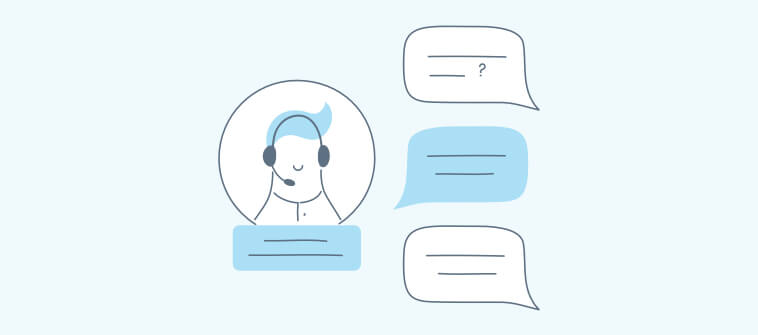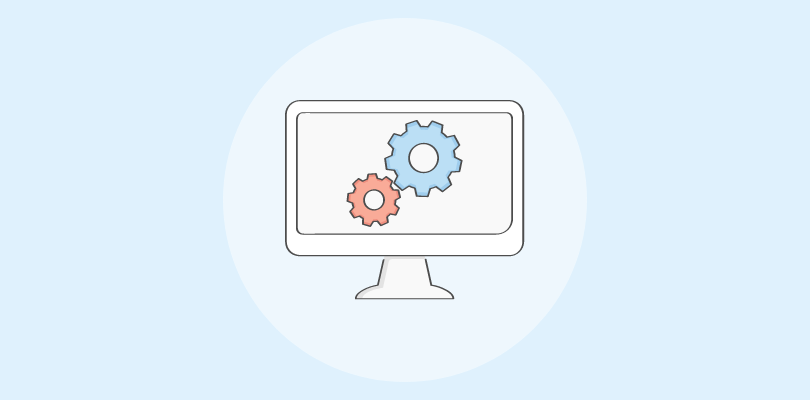While implementing any customer success programs, you might find yourself in a tricky spot – “Are customer success and customer support the same thing? If they are different, how should we set different goals for these teams?”
In this battle of customer success vs customer support, you can spot differences between them, but there is also a common thread that binds them. The goal of both these disciplines is all about delivering exceptional experiences.
The concept might appear pretty straightforward at first. However, many important business decisions – such as which customer support software to use or how many customer success specialists you need, will be based on how well you understand these terms.
What Is Customer Support?
Customer support refers to the range of services you offer your customers to resolve their issues or simply to help them get the most out of your products. Customer support involves actions such as answering customer questions, ensuring a smooth onboarding process, troubleshooting issues, and assisting customers in buying new products or upgrading their service subscription.
“Excellent customer support is the number one job in any company. It is the personality of the company and the reason customers come back. Without customers, there is no company.”
– Connie Elder
In the general sense, we all know what customer support means. However, the channels and the tools being used to support customers are constantly evolving. Right from traditional call centers to AI-powered customer service systems that can be accessed anytime and anywhere, we have surely come a long way.
Now, it is important to note that many companies use the terms customer support, customer service, or customer assistance interchangeably. Despite the subtle differences between these terms, the broader principle remains the same – to ensure customers get a hassle-free after-sales experience.
What Is Customer Success?
Customer success refers to a company-wide initiative that seeks to provide value and improve the success rates of customers. The central focus of customer success is to understand what success means to your audience and to help your customers achieve it across multiple touchpoints in their customer journey.
“Until you know what it takes to achieve success from your customer’s perspective, you will just waste valuable time.”
– Jason Whitehead
While defining customer success, there are other aspects you should consider. Customer success is a proactive approach that consists of:
- Building and nurturing relationships with customers
- Understanding their various challenges, process bottlenecks, etc.
- Facilitating the successful implementation of your products or services
Now that we have explored the definition of customer success and customer support, let us understand their differences in the next section.
What Is the Difference Between Customer Support and Customer Success?
At this point, it is clear that both customer support and customer success help customers derive value from your products and services. But what about the differences?
Here are 6 points that clearly highlight the difference between customer support and customer success:
1. Approach: Customer support is majorly reactive, while customer success is proactive
Customer support is reactive in the sense that support professionals respond to customers only when they share their concerns or complaints. The primary goal is to resolve issues as and when they come to ensure customers can have a hassle-free experience with your brand.
On the other hand, customer success is about proactively helping customers attain their goals. Customer success professionals form the right strategies to allow customers to achieve their goals at every stage of the customer journey – both before and after the sales.
2. Duration: Customer support is immediate, while customer success encompasses the entire customer lifecycle
Customer support is based on interactions that are often short-lived. The duration of such interactions depends on the communication channel used. For instance, a customer might receive assistance almost instantly over the phone or live chat, compared to email, which might mean hours to get a response from the concerned team.
On the other hand, customer success is a more long-term, proactive approach. It involves building ongoing relationships and ensuring customers derive continuous value from a product or service. Customer success aims to maximize the overall customer experience and satisfaction throughout the entire customer lifecycle.
3. Professional Skills: Customer service requires more empathy, while customer success demands more persuasion skills
Customer support is a relatively older field that has existed in the business world for decades, and therefore, the skills needed to succeed are well understood. Customer support professionals are customer-facing and must possess skills such as empathy, leadership, clear communication, the ability to use positive language, etc. Since service reps have to deal with complaining customers day in and day out, they need to have tonnes of patience.
Customer success is a new field, and success teams are usually not as big as support teams. Such professionals must have a comprehensive understanding of who the customer is and great persuasion skills to keep customers loyal to the brand. Customer success specialists or managers should be able to anticipate customer needs and make long-term strategic decisions.
4. Measurement: Customer support metrics prioritize speed, while customer success metrics focus on business value
Customer support metrics are captured to measure the speed and quality of day-to-day customer service interactions.
Customer Service Metrics:
- Response Time: Measures how quickly customer inquiries or issues are addressed by the support team, reflecting the efficiency of resolving immediate concerns.
- Resolution Time: Tracks the duration it takes to fully resolve a customer’s problem, indicating the effectiveness of the support process in providing solutions.
- Customer Satisfaction (CSAT): Assesses customer contentment with the support received, often measured through surveys or feedback, offering insights into the quality of service provided.
On the other hand, customer success focuses on broader metrics that can have a long-term impact on the business.
Customer Success Metrics:
- Customer Retention Rate: Calculates the percentage of customers retained over a specific period, demonstrating the success of ongoing efforts to maintain long-term relationships.
- Net Promoter Score (NPS): Measures customer loyalty and satisfaction by assessing the likelihood of customers recommending the product or service, indicating overall success in meeting expectations.
- Expansion Revenue: Evaluates the additional revenue generated from existing customers through upsells, cross-sells, or expansions, showcasing the success of customer success initiatives in driving business growth.
Read More: 15 Help Desk Metrics to Improve Customer Support
5. Strategies: Customer support strategies focus on automation, while customer success strategies focus on improved CX
Aligning customer success and customer support might not always be a good idea. You need to form different strategies to make them work.
Some examples of customer support strategies include:
- Use the right customer support tool to automate manual processes, track tickets in a central place, and monitor performance
- Regular training sessions to improve the skills of customer support agents
- Capture customer feedback right after the commencement of a support interaction
Some examples of customer success strategies include:
- Improve the customer onboarding process for a smooth transition from the acquisition stage
- Create more content to educate customers and help them understand your products/services better
- Create customer loyalty programs to encourage loyal customers to buy more
Read More: 30 Customer Service Tips for Delightful Customer Experiences
6. Business Growth: Customer success has a more long-term business impact compared to customer support
Both customer support and customer success play an important role in business growth and longevity. Let’s see how that works:
Customer support is an uncompromisable part of any business as you always need to assist customers with their issues. Fast and delightful customer support can help you retain customers and improve the customer experience.
According to a study by Dimensional Research, 52% of customers say they have made an additional purchase from a company after a positive customer service experience.
Now, customer success is a value-based business function that can help your business drive revenue and expansion. According to Tempkin Group, a slight increase in customer experience generates an average revenue increase of $823 million over three years for a business with $1 billion in annual revenues.
What Are the Common Factors Between Customer Success & Customer Support?
Customer success and customer support are two essential functions within a company that share common goals and objectives but differ in their approaches.
Firstly, a key common factor is customer-centricity. Both customer success and customer support revolve around putting the customer at the center of their efforts. Customer support addresses immediate issues and concerns, providing timely assistance and resolutions, while customer success focuses on the long-term success of the customer by ensuring they derive ongoing value from the product or service. Both functions aim to understand customer needs, anticipate challenges, and proactively address issues to build trust and loyalty.
Secondly, effective communication is crucial in both customer success and customer support. Clear and open communication helps in understanding customer requirements, managing expectations, and delivering solutions efficiently. Whether it’s resolving a specific problem in customer support or guiding customers to maximize the use of a product in customer success, communication plays a pivotal role in building a strong customer-business relationship.
FREE. All Features. FOREVER!
Try our Forever FREE account with all premium features!
Customer Success Vs. Customer Support: Which One Should You Prioritize?
If your business has embarked on a long journey and wants to grow quickly, you need to prioritize both customer support and customer success.
While reviewing customer success vs. customer support, we realize that both these terms are different sides of the same coin. While there are evident differences in approach, duration, skills, and strategies, they are both about improving the customer experience and enhancing business growth.
Depending on the size of your business, you should have different customer support and success teams. However, you can always make your success teams work in sync with other customer experience-centric teams, such as support or sales. Give each department their specific goals and keep a common goal – to make every customer interaction count.
Learn More About Customer Success and Customer Support
Can you provide examples of scenarios where a customer would interact with customer Success versus customer support?
A customer might contact customer support when facing difficulties in installing software. In contrast, interactions with customer success may involve a proactive outreach to guide the customer through advanced features, offer personalized training sessions, and gather feedback to enhance their overall experience with the product.
In terms of resources and staffing, how does the structure of a Customer Success team differ from that of a Customer Support team?
A customer success team often focuses on proactive strategies, requiring a smaller but highly skilled team for personalized interactions. In contrast, a customer support team is typically larger, handling a higher volume of immediate queries, and is structured to provide efficient and timely issue resolution.
Can a business have one without the other, or are both customer success and customer support essential for a successful customer experience?
Both customer success and customer support are integral for a successful customer experience. While customer Support addresses immediate concerns, customer success ensures long-term satisfaction by proactively guiding customers to maximize product value. Together, they create a holistic approach, fostering loyalty and enhancing the overall customer journey for sustained success in business-customer relations.
 Tips
Tips
We’d love to hear your tips & suggestions on this article!
FREE. All Features. FOREVER!
Try our Forever FREE account with all premium features!

 We'd love your feedback!
We'd love your feedback! Thanks for your feedback!
Thanks for your feedback!







